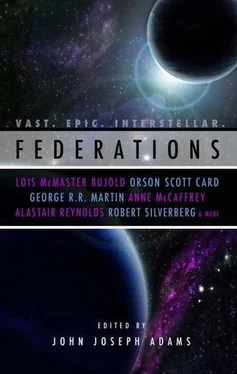Dragon often came to listen, offering neither encouragement nor criticism. Rather than applauding, he left her the figurines he whittled. Swan decorated her room with them.
“Are you an artist?” she asked Dragon once after botching her warm-up scales on the flute.
“No,” Dragon said. “I could play a chord or two on your keyboard, but that’s all.”
Swan turned her hand palm-up and stepped away from the keyboard, offering. Smiling, he declined, and she did not press him.
After fifty-seven swanships—months as the station reckoned time—Swan asked the others if she could move her keyboard into the observation room. Dragon not only agreed, but offered to help her move it, knowing that Swan felt uneasy around the station’s mechanical servitors. Phoenix said she supposed there was no harm in it. Tiger laughed and said, “Anything for you, cygnet.” Swan was horribly afraid that Tiger meant it. Tortoise didn’t respond, which the others assured her was a yes.
Swan wrote fragments of poetry for each ship thereafter, and set them to music. The poetry itself was frequently wretched—Swan was honest enough with herself to admit this—but she had some hope for the music. She was briefly encouraged by her attempts at orchestration: bright, brassy fanfares for ships that had served in battles; shimmering chords for ships built with beauty rather than speed in mind; the menacing clatter of drums for those rare ships that defied their fate and swung around to attack the station.
Tiger deigned to listen to one of Swan’s fragments, despite her ordinary impatience for musical endeavors. “Orchestrate a battle; orchestrate a piece of music. This isn’t the only language that uses the same verb for both. Your battle, cygnet, is a hundred skirmishes and no master plan. If you plan to do this for every swanship that is and has ever been, you’ll die of old age before you’re finished.”
“I’m no general,” Swan said, “but I have a battle to fight and music to write.”
“I can’t decide whether your persistence is tiresome or admirable,” Tiger said. But she was smiling, and although she didn’t seem to realize it, her foot was still tapping to the beat.
Swan had already returned to the keyboard, sketching a theme around the caesuras of an ancient hymn. Lost in visions of ships stretched beyond recognition, she did not hear Tiger leave.
• • •
Phoenix had held herself aloof from Swan after their initial introduction. This was not a matter of personal ill-will, as Dragon told Swan. Phoenix didn’t hold anyone but herself in high regard, and she locked herself away in pursuit of her own art, painting.
Perhaps Swan’s diligence impressed Phoenix at last. It was hard to say. Tiger paid as little attention to Phoenix as possible, and urged Swan to do likewise. “She’s forever painting nebulae and alien landscapes, then burning the results,” Tiger said contemptuously. “What’s the point, then?”
Dragon said that everyone was entitled to a few quirks. Tiger remarked that anyone would say that of a former lover. At that point, Swan excused herself from the conversation.
“I have heard that you started the first movement of your symphony. I should like to hear it,” Phoenix said to Swan through the station’s most impersonal messaging system.
So Swan invited her to the observation room at an hour when no swanships were scheduled to arrive. She played the flute—her best instrument—to the station’s recordings of the other parts; the libraries had included numerous sequencers.
Phoenix applauded when Swan had finished. Her expression was reluctantly respectful. Gravely, she said, “This captain of yours—”
He’s not mine, Swan thought, although perhaps I am his.
“—do you know anything of his musical preferences?”
Swan shook her head. “I tried to find out,” she said. After all, if the captain had possessed enough influence to send her to the swanwatch, he might also be able to influence the selection of judges. “He commissioned a synesthetic opera once, which I have no recording of. Beyond that, who knows how he interprets the grave-of-ships? And if I am to do each swanship justice, shouldn’t I draw upon the musical traditions of their cultures? Some of them contradict each other. How am I to deal with this in a single finite symphony?”
Phoenix lifted an eyebrow, and Swan felt ashamed of her outburst. “Do you know why we’re here, Swan?” she asked. She was not referring to their official mission of contemplating the fermata to further their art.
“It seemed impolite to ask,” Swan said.
“Tiger is a war criminal,” Phoenix said. “Tortoise is a scholar who resigned and came here to protest the policies of some government that has since been wiped out of time. It might even have done some good, in the strand of society where he was famous. I, of course, am here as unjustly as you are.” She did not elaborate.
“And Dragon?”
Phoenix smiled thinly. “You should ask Dragon yourself. It might make you think twice about your symphony.”
• • •
Swan wouldn’t have realized anything was wrong if Tiger hadn’t sent her a message while she was in the middle of working on her second movement. The idea had come to her in the middle of her sleep shift, and she was kneeling at the zither, adjusting the bridges.
“Urgent message from Tiger,” the station informed her.
“Go ahead,” Swan said absently, trying to decide what mode to tune to.
Tiger’s voice said, “Hello, cygnet. It’s Tortoise’s watch, but he seems to be asleep as usual, and you might be interested in going to the observation room.”
Tiger’s tone was lazy, but she had flagged the message as urgent. What was going on?
“Station,” Swan said, “who’s in the observation room now?”
“No one,” it said.
“Is there a swanship scheduled to arrive soon?”
“There is an unscheduled swanship right now.”
Swan rose and ran to the observation room.
Tiger had been correct about the importance of ritual. No matter how smoothly a ship descended into the fermata, Swan always checked the ship’s status. Swanships did occasionally arrive off-schedule, but she wondered why Tiger had sounded concerned.
So she looked at the ship, which was tiny, with an underpowered sublight drive, and its crew, a single person: Gazhien of the Circle of Swords .
She knew that name, although ages had passed since she had used it. It was Dragon.
She asked the station what the Circle of Swords was. It had been a swanship nearly a century ago, and all but one member of the crew had passed into the fermata on it.
“Swan to Dragon,” she said to the tiny ship, which was one of the station’s shuttles. “Swan to Dragon. Please come back!”
After a heartstopping moment, Dragon replied, “Ah, Swan.”
Swan could have said, What do you think you’re doing? , but they both knew that. Instead, she asked, “Why now, and not tomorrow, or the day before? Why this day of all days, after a century of waiting?”
“You are as tactful as ever,” Dragon said, “even about the matter of my cowardice.”
“ Please , Dragon.”
Dragon’s voice was peculiarly meditative. “Your symphony reminds me of my duty, Swan. I came here a long time ago on the Circle of Swords . It was one of the proudest warships of—well, the nation has since passed into anarchy. I was the only soldier too afraid of my fate to swear the sacred oath to sing always against the coming silence . As punishment, they left me here to contemplate my failure, forever separated from my comrades.”
“Dragon,” Swan said, “they’re long gone now. What good will it do them, at this end of time, for you to die?”
Читать дальше












